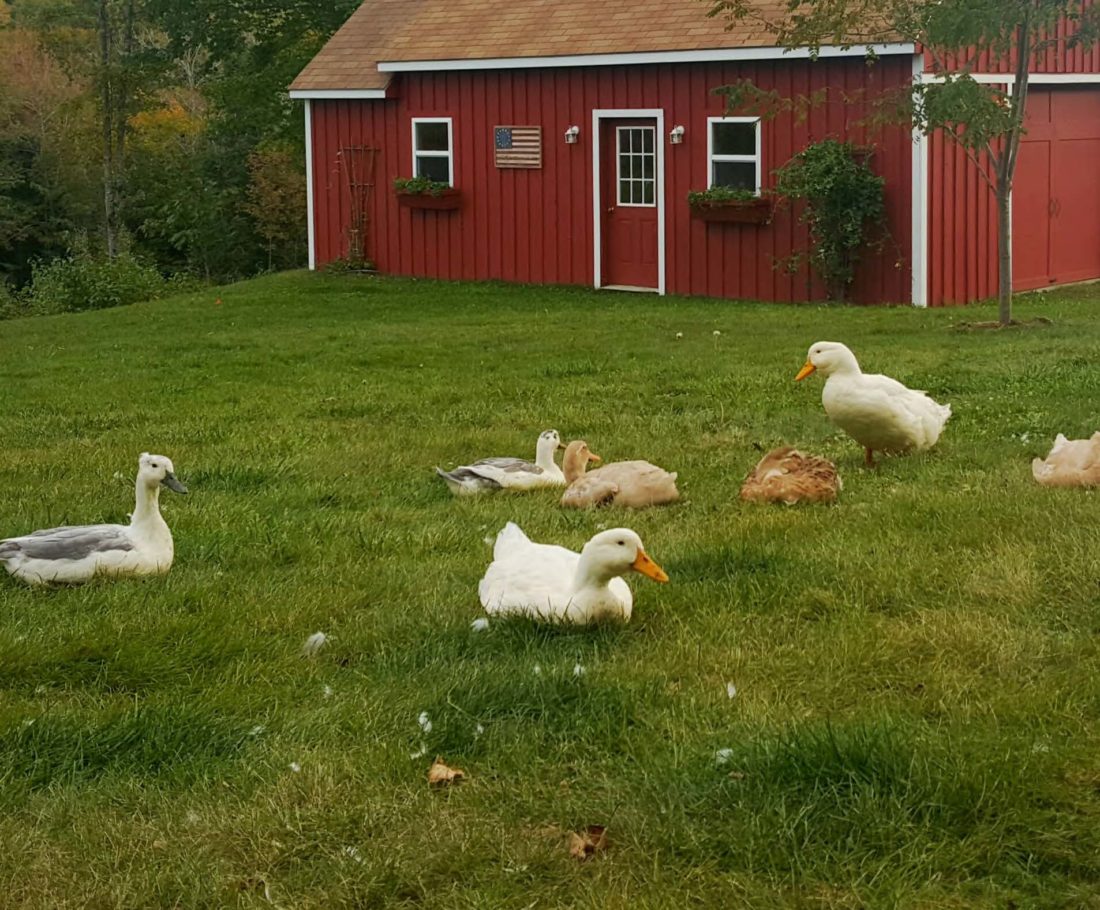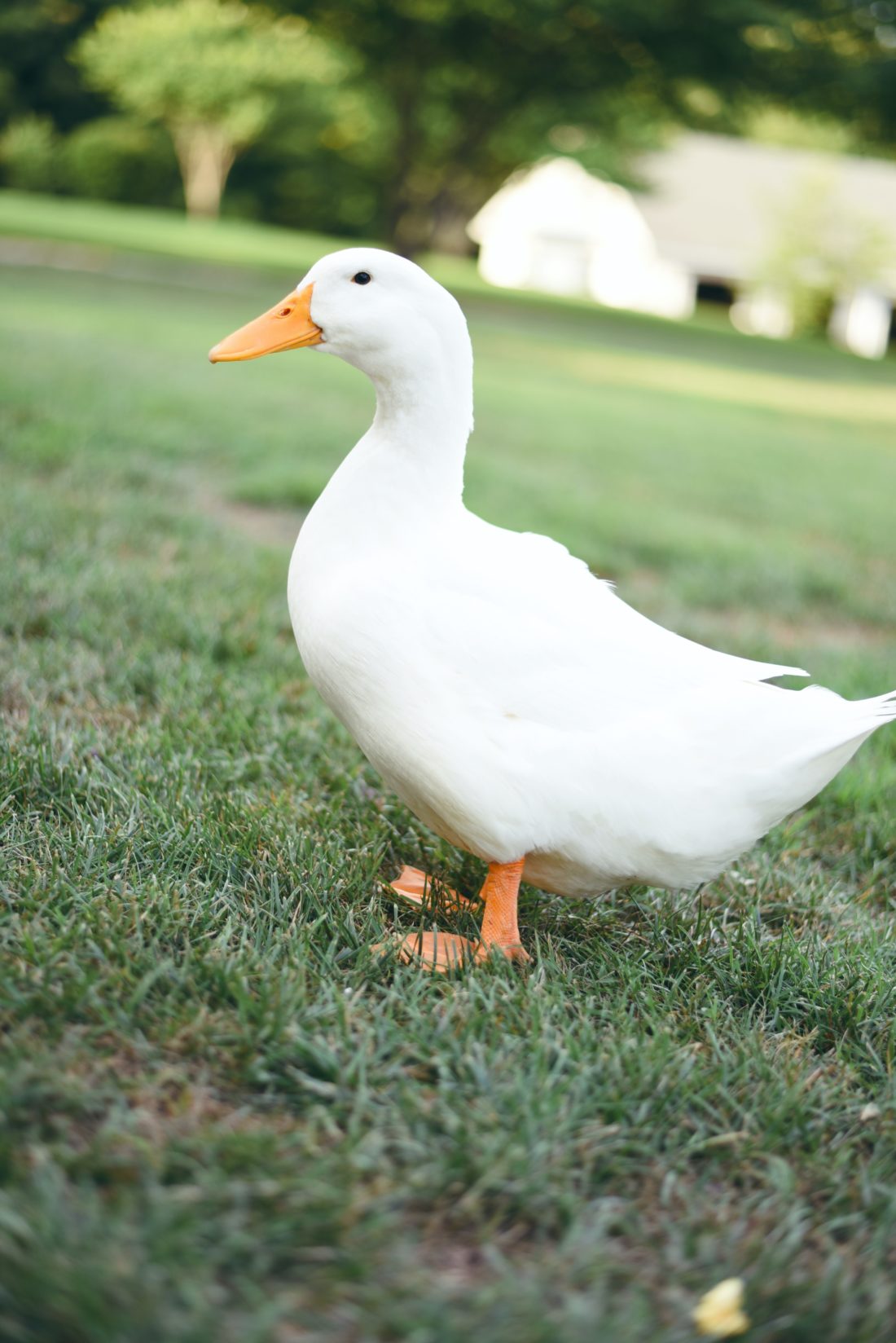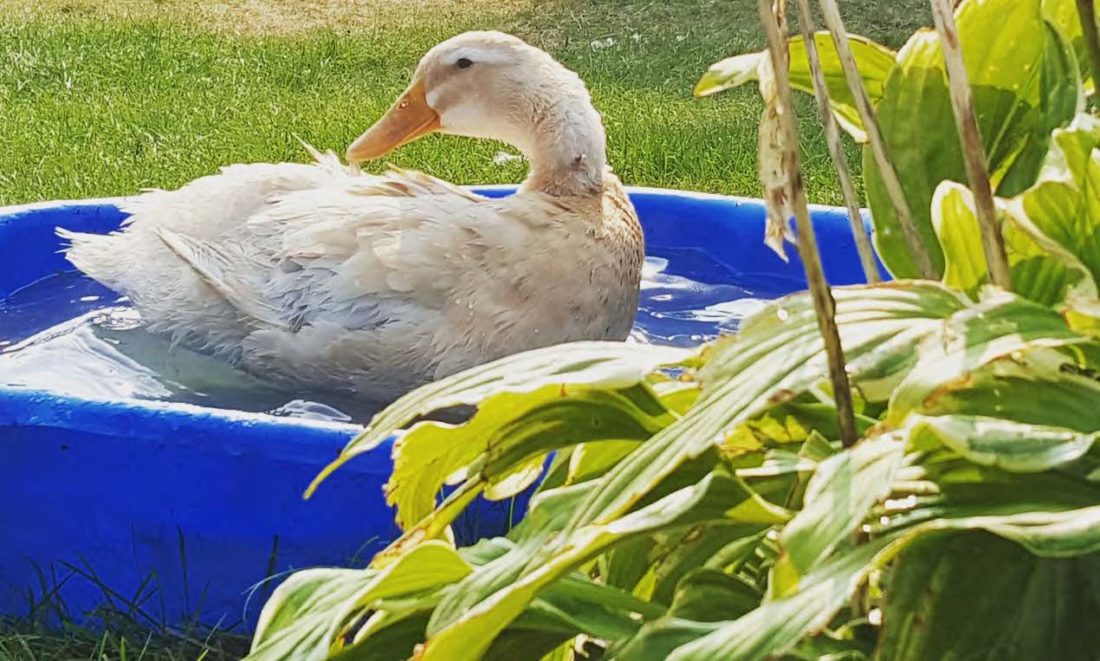Unless you’ve been living under a moss-covered rock in your perfectly manicured, abundantly productive garden, you know that backyard chickens are a “thing”. It seems that lately, everyone is building a cute little coop in their backyard to house everything from a suburban-friendly trio to a dozen hens or more. And you can’t beat fresh eggs. But have you considered Ducks for the garden?

The Problem with Backyard Chickens in the Garden
While chickens do a pretty good job of bug control and can help eliminate weeds, letting a gang of marauding chickens roam your yard isn’t exactly conducive to a pristine landscape or keeping your garden full of vegetables or flowers. Chickens will eat weeds, but also will scratch up small seedlings and eat all the blooms off your prized rosebushes. Although they technically can’t fly, a determined hen can flutter and flop her way up into a window box or over a low fence and completely decimate a garden in one afternoon. They can peck holes in tomatoes and squash, and will leap to snatch peas and beans right off the vine.
Why are Ducks Better Garden Pets than Chickens?
On the plus side, chicken manure is some of the best fertilizer you can put on your garden. Chickens are also wonderful at aerating and tilling garden plots in the off-season. So, adding a small flock of poultry to your backyard can be beneficial. But why all this clucking over backyard chickens when a better choice for garden lovers, just might be the “mighty” duck.
Domestic ducks can’t fly. Once full grown, they usually can’t clear a low fence. It’s easy to keep them out of protected areas with a short fence that you can step over. Ducks don’t scratch in the dirt or damage plant roots like chickens do. Ducks may inadvertently trample small plants. But if you cage seedlings, when they have reached a foot or so they should be safe from the ducks. Ducks won’t scatter mulch or landscape stones like chickens will, kicking them out of the beds and onto your grass or pathways. Ducks do like to drill holes into the ground looking for bug larvae and worms, but that’s good aeration for your soil. And, on the plus side, ducks will gobble up every slug and grub they can find, keeping your garden wonderfully bug-free.
Ducks are known to be voracious eaters and may consume plants in your garden (if you don’t fence them out). They particularly enjoy vegetables, fruits, and tender greens. To protect your garden, consider installing barriers or using natural repellents to deter ducks from feasting on your plants. Regularly check your garden for any signs of duck damage.

Duck manure and chicken manure are both valuable organic fertilizers, but they have some key differences. Duck manure is higher in nitrogen and phosphorus, making it great for promoting green, leafy growth. Chicken manure, on the other hand, is higher in potassium and can help with flower and fruit development. Ultimately, the best choice depends on your specific gardening needs.
Ducks also poop. A lot. And, unlike chicken manure, which is “hot” and needs to age for three to six months before being used in a garden, duck manure can be used immediately.
Unlike a loud-crowing rooster or hens who feel the need to cackle and announce to the world that they’ve laid their egg, annoying your neighbors, ducks are relatively quiet. Males ducks (drakes) don’t quack at all. Instead, they make a low, raspy sound. Female ducks do quack, but for the most part will just chitter-chatter quietly among themselves unless they get excited.
How to Feed and care for Ducks

Ducks enjoy a small kiddie pool to splash around in, and using that wonderfully nitrogen-rich water to moisten your garden will result in very happy landscaping! If you’re ambitious, you can sink a large tub with a drain or turn your koi pond into a duck pool – but be aware they will eat your koi! Add a fountain or filter and you have a pretty easy way to keep your ducks entertained, clean and healthy.
Ducks are vulnerable to predators so they do need a secure house to sleep in at night. The house doesn’t need to be fancy. A child’s playhouse or garden shed makes a beautiful duck house. Put on a secure door with a predator-proof lock. Cover the windows with welded wire to keep out pesky raccoons, and your ducks will be perfectly safe and happy. A nice thick layer of straw on the floor is all they require. Ducks don’t roost on perches like chickens, nor do they need special boxes in which to lay their eggs. They instead prefer to make their own nest in one corner on the floor in the straw as well.
Ducks can eat chicken layer feed if you can’t find any waterfowl feed and, of course, they need fresh water every day. They do like to make quite a mud mess around any water source, so be sure to position their water and pool tucked in a rarely used corner of your yard.
Backyard ducks are more fun than backyard chickens
Ducks are social creatures and really do better as part of a flock. A minimum of three ducks is a good starting point. Three females is your best choice if you are interested in their eggs. Like chickens, ducks will lay eggs without having a drake hanging around. Ducks are excellent layers, laying an egg just about every day year-round. If you think you might like to try hatching some baby ducks at some point, then a male and two females would work best for you. If you aren’t interested in eggs, a flock of three males is also an option.
Ducks are the clowns of the barnyard. They’re funny and quirky, bursting with personality. They love to play and are mischievous little creatures. Always on the move, they are always looking for something to swim in – even the dog’s water bowl left on the back porch will do; thank you very much!
Bottom line, if you have been thinking about starting a backyard flock (of chickens or any other fowl) and are an avid gardener who values lawn and landscaping as well, ducks are a better choice. Low fencing will help protect your plants while your ducks roam the lawn, eating pests and fertilizing it. Unlike chickens, who can turn a lush, green plot of grass into a barren dirt wasteland in no time, all ducks will do is drill small holes here and there and flatten tall grass. Other than that, ducks and gardens can quite happily co-exist, creating a backyard oasis for you and your family.
All Images and text by Lisa Steele except Duck image by Christian Bowen on Unsplash
+comments+